#orc license
Text
Entry to the BRP Design Challenge is free.
As part of submission, entrants will need to provide:
A pitch for their game (both in long and short form).
A production budget for their game.
An outline on how the winnings from the BRP Design Challenge will help bring their game to life
A competitor market analysis of their game, showcasing where it fits in the market as a product.
How the BRP rules have been used in their game.
What makes their use of the BRP system, their setting, and/or the gameplay experience unique.
All entrants retain ownership of their work in its entirety. Chaosium does not require the signing over of rights of any kind in order to enter the BRP Design Challenge.
Winners and shortlisted entries will also retain ownership and—regardless of what winnings may be received as part of this competition—may still publish their games royalty-free under the ORC license.
34 notes
·
View notes
Text
WotC: Introduces the OGL 1.1
Paizo:
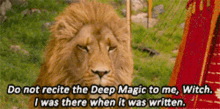
#dnd#wizards of the coast#wotc#ttrpg#d&d#dungeons and dragons#paizo#paizo publishing#pathfinder#ogl 1.1#ogl#orc#orc license
182 notes
·
View notes
Text
For people working on their own systems, and those that have published their own systems already, what licenses do you recommend? I'm obviously aware of the OGL (and its flaws) and Creative Commons, but what else is there? I've also come across Paizo's ORC license (though I haven't looked into it so far) and heard mention of the Shadowdark license, but I wondered if anyone here has advice or use-cases for the different licenses available.
#thecoppercompendium#ttrpg community#ttrpg#licenses#thecoppercompendium discussion#OGL#ORC license#Shadowdark license#Creative Commons
8 notes
·
View notes
Text
Abducted - solo/co-op story telling TTRPG
👽🛸
Since the start of the year, I’ve been developing a simple story telling TTRPG about a human being abruptly abducted by extraterrestials.
The game mechanism revolves around drawing cards from a standard deck of playing cards and resorting to tables with prompts depending on what you pulled.
Play throughs could have you facing off against hostile or inquisitive extraterrestials, discovering flora or fauna that’s stored on their ship, and even coming across weapons or alien artifacts on board.
Whether you wish to cooperate with the aliens or plot an escape is completely up to you.
I’ve included rules for co-op play that encourages 1 player acting as the human, and 1 player acting as the extraterrestials.
I’ve commissioned a pixel artist to render the game cover, and I couldn’t be more please with their results 👾
(WIP pics below)

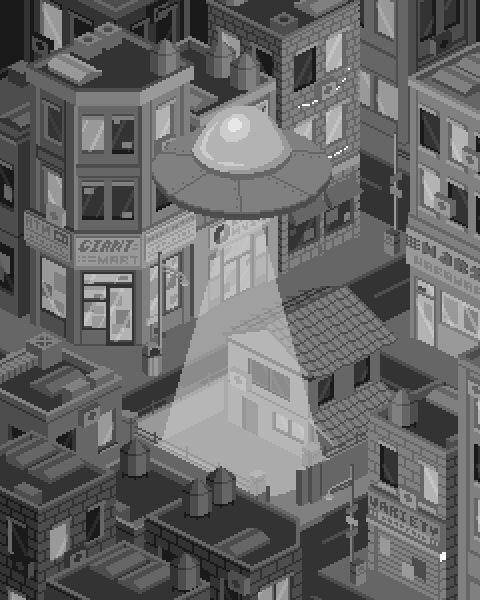
I can’t wait to share with you all the final product :)
I’m planning to upload it to itch.io for free, so stay tuned!
#solo ttrpg#solo rpg#abducted#alien abduction#rpg#role playing games#gaming#games#game design#franco games#pixel art#indie game#indie ttrpg#scifi#indiegamedev#indie#opendnd#ogl#orc license#dndbegone
43 notes
·
View notes
Text

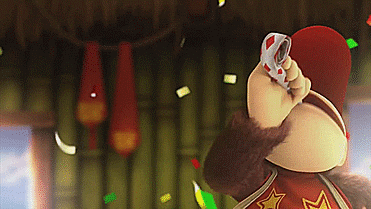
45 notes
·
View notes
Text


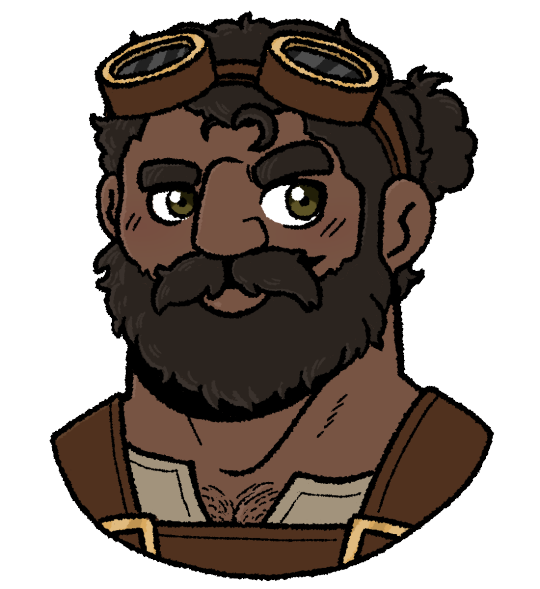


More Pathfinder Infinite work! These pieces were made as part of the We're Strong Together Team's collaborative project called "Orcs Strong Together" where I got to draw two NPCs for the module and one accompanying character illustration for the orc bloodline sorcerer along with two little emotes to celebrate the ORC license!
If you're interested at all in checking out a bunch of new Orc themed player options and an adventure to go along with it you can take a peek here:
https://www.pathfinderinfinite.com/product/427859/Orcs-Strong-Together?affiliate_id=1244547
#pathfinder#pathfinder 2e#pf2e#ORC license#ORC#orc#half orc#pathfinder infinite#3rd party#illustration#character design#digital art#ttrpgs
10 notes
·
View notes
Text

15 notes
·
View notes
Text
What even is OGL?
TLDR: OGL stands for Open Game License and is a public copyright license that allows people to use certain parts of the game system- most notably the mechanics.
It was supposed to be irrevocable and permanent at LEAST for the editions made before and up to it's inception. It is also why/how D&D is the game that you have heard of and not something more generic.
It was actually a brilliant business plan hatched by a man who understood the product, and supported by others that also understood how much they'd come to owe a happy community for the success of the game.
Let's talk about it!
A "Brief" History of Open Gaming - or, How WotC is Shitting on 20 years of a good thing -
Waaaay back in 2000 WotC released the first OGL for D&D 3.0. This was awesome because it meant that there was a nice legal way for people to essentially share their home brew - rules, settings, modules, entire campaigns. It took away the fear of lawyers and placed a chunk of the rules in the creators hands and said, "Here, so long as you follow the rules, you can use this part."
Ryan Dancey, the person who started the negotiations for WotC to buy TSR in the first place - the original owners of D&D - was the person running the show back then and he believed that the way to have D&D be a business success was to have a thriving creative community.
"I think there's a very, very strong business case that can be made for the idea of embracing the ideas at the heart of the Open Source movement and finding a place for them in gaming. One of my fundamental arguments is that by pursuing the Open Gaming concept, Wizards can establish a clear policy on what it will, and will not allow people to do with its copyrighted materials. Just that alone should spur a huge surge in independent content creation that will feed into the D&D network."
And boy was he right! See, the idea here is that if they open up their system (Known as the d20 System) then players learn this system across several genres/settings making it a standard.
Content creators were happy, the D20 System became a standard, everybody (mostly) happy. They even won over a lot of the Grognards who weren't happy with the changes being made to D&D.
Dancey understood the product they were selling.
When 4th came out in 2008 they released the GSL - Gaming System License. It was more restrictive than the previous OGL and like WotC themselves predicted, the community largely ignored 4E (Side Note - 4th is actually my favorite system and it makes me sad that greed ruined it), or even outright shunned it and we saw the brith of Pathfinder - under the OGL, they used the 3.5 ruleset and essentially made their own D&D - with blackjack, and hookers! Several of the people at Paiso used to work for WotC and genuinely believed in Open Gaming and working WITH content creators.
The GSL was, in Andy Collins words, "a Frankenstein's monster of an open license that ended up pleasing basically nobody."
There was less content made by 3rd parties, so instead of a new system having your usual Grognards who just didn't like change, and the people who tried the new system and didn't like it, you added a whole swath of people who were also mad that WotC had changed the rules they said they wouldn't - and since the old OGL was still active for previous editions, they just didn't hop on board the 4th Edition train.
In 2016 we saw a return to the old OGL and they even added another option for content creators - The Dungeon Masters Guild storefront - which allowed people to make content for specific WotC owned settings (creators set their own price, but WotC and OneBookShelf took 50% of proceeds).
In August 2022 rumors started that the OGL was in danger again, aaaand you're probably reading this because you've heard about or seen the new OGL 1.1 leaks and the backlash that is occurring.
Until WotC actually makes official statements on all this, everything is alleged and plenty of people are covering the leaked document and what it might/does mean so you can find that elsewhere (this is already long-winded!) but I'll give my thoughts on the topic.
My personal thoughts/opinions -
It's pretty easy to ignore some of the new OGL when you see things like you have ot make $50,000 on your product for WotC to want it reported or $750,000 for them to want royalties (at 20-25%, ouch!) because they're going after people who are making some money and can maybe afford it - I even kinda get it - they see how their property has become a household name and want to find ways to make even more money off of it. They want a slice of the pie these 3rd party creators are baking. I get that. And if it was like 4.0 where the old OGL still stood and you could just keep making content for that system and ignore the new system- then I wouldn't care.. but this is much worse. They want to walk back a license that they told people would not be revoked. That people have made a living off of. They also want to be able to just poach your ideas from what you make and not have to share any pie with you - as an artist, ownership of my own IP is something I value.
The thing is, while WotC might own D&D, they didn't CREATE it. This is a huge faceless company that doesn't care about people. They are not your friend and they have shown their hand - they didn't learn the correct lesson from 4th, or see that we as a community were forgiving them with 5th - they just see money and want to squeeze us all for everything we got. They don't understand their product or the community and they want to not only take, take, take, but if we let them, then we set a dangerous precedent that licenses that are supposed to be irrevocable can simply be torn up, and that they can just take your hard work and keep it for themselves.
Now, I don't think they can actually legally revoke the OGL 1.0 - but if they do somehow, that's no bueano for more than just TTRPGs, and isn't it bad enough that they're trying to? Is there really ANYTHING they could do to save this? I'm pretty open-minded, maybe some gesture exists, but I can't imagine it right now.
If you read all that, thank you!
Here's a silver lining for you - Paizo is releasing their own ORC - Open RPG Creative License that they are entrusting to a law firm to keep it open. Read more about it HERE
#ogl 1.0a#ogl 1.1#open gaming license#dungeons and dragons#dnd#TTRPG#ORC License#paizo#history lesson
10 notes
·
View notes
Text
youtube
My post covering this stuff is here. If you prefer to listen instead of read, CritCrab's videos cover just about everything up to the time of me writing this. Only thing he hasn't mentioned in a video
Paizo (creators of Pathfinder), Kobold Press, and a sizeable collection of other large name creators have joined together to make the Open RPG Creative License (or ORC License). It will be a system-agnostic license that is irrevocable, and will never be owned by a company that makes money off of publishing RPGs to ensure it can never be jeopardized. Their full statement is on their website, the link for that is here.
My sincere hope is that this will allow creators who love 5e and don't want to leave that system if they can help it to continue publishing 5e-compatible content that they're passionate about, under ORC instead of any bullshit OGL at Hasbro's control. The path forward will require time and effort and, more than likely, some manner of adjustments... but as someone who absolutely Does Not Want to leave 5e despite being thoroughly repulsed by WotC's behavior, I actually have a shred of hope again. I am deeply, deeply appreciative of Paizo today.
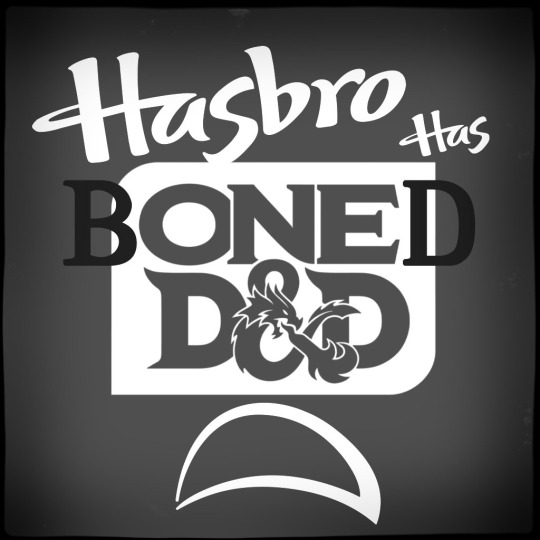
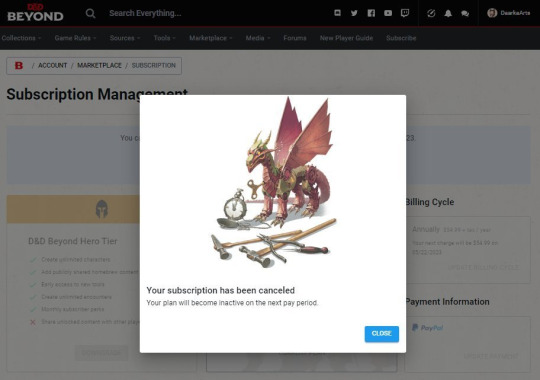
#opendnd#orc license#paizo#kobold press#dndbegone#stopthesub#fuckhasbro#onednd#dnd#dnd5e#ttrpg#rpg#pathfinder#ogl#daarka gekkers#Youtube
9 notes
·
View notes
Text
Finally got around to reading Paizo's statement on the OGL fiasco (available here). I have Thoughts™, mostly good ones.
Before we begin, let me just say this opening is absolutely balling:
We believe that any interpretation that the OGL 1.0 or 1.0(a) were intended to be revocable or able to be deauthorized is incorrect, and with good reason.
We were there.
Power moves aside, the announcement of the Open RPG Creative License (ORC) is very encouraging. Two particular points stand out to me in the discussion.
The Good
First, a quote from the statement (emphasis in original):
the release of a new open, perpetual, and irrevocable [license]
The emphasis on 'irrevocable' suggests that Paizo are very aware of the major flaw in the original OGL, namely that while the text of the license started it was perpetual and that any version of the license could be used, it did not include the word 'irrevocable' anywhere in the text, which allowed the legal loophole that WotC are using to abuse that very license.
Second, the statement tells us that the ORC License will be 'system agnostic'. This is a very good sign - the original OGL was very much designed around D&D (originally 3e), and it was never intended to carry the burden of being the single license by which almost all TTRPGs that want to cultivate third party content are released.
Thirdly - and this is the bit I find most exciting - we get the following little tidbit:
The ORC will not be owned by Paizo, nor will it be owned by any company who makes money publishing RPGs. Azora Law’s ownership of the process and stewardship should provide a safe harbor against any company being bought, sold, or changing management in the future and attempting to rescind rights or nullify sections of the license. Ultimately, we plan to find a nonprofit with a history of open source values to own this license (such as the Linux Foundation).
This is excellent news - when I heard Paizo are spearheading the attempts to develop an alternative open license for TTRPGs outside of the scope of WotC monopoly, my immediate worry was: what's to stop Hasbro performing an aggressive buy-out of Paizo, and then we'll all be back in the same soup?
By guaranteeing that they do not own the license, Paizo hedge against this possibility - and if they do get it into the hands of a committed non-profit like the Linux Foundation, that would work as a fairly robust buffer against any attempts by Hasbro or any other would-be monopoly to get their hands on the license and pull the kind of BS that WotC/Hasbro are trying with the OGL.
The Bad?
That said, I still have some concerns, and I will definitely be waiting to see the final details of the ORC license.
My greatest worry at this point revolves around how whether the ORC license will follow the structure and scope of the OGL, particularly when it comes to the delineation of Open Game Content vs. Product Identity in the context of non-copyrightable material.
One of the major problems with the old OGL - discussed at length in this EFF article - is that it claims to be giving you the right to use 'the game mechanic and includes the methods, procedures, processes and routines' of the d20 system, but as a matter of fact, game mechanics are non-copyrightable. As such, all the license really gives you is the right to reproduce the exact wording used but WotC in the SRD to describe the game system, and in return you sign away any rights you may have had to using the content delineated as Product Identity. As the EFF article puts it (emphasis added),
For most users, accepting this license almost certainly means you have fewer rights to use elements of Dungeons and Dragons than you would otherwise. For example, absent this agreement, you have a legal right to create a work using noncopyrightable elements of D&D or making fair use of copyrightable elements and to say that that work is compatible with Dungeons and Dragons. In many contexts you also have the right to use the logo to name the game (something called “nominative fair use” in trademark law). You can certainly use some of the language, concepts, themes, descriptions, and so forth. Accepting this license almost certainly means signing away rights to use these elements. Like Sauron’s rings of power, the gift of the OGL came with strings attached.
In short, the original OGL is kind of a lie - it makes it seem like you need a license for content that is non-copyrightable, and then offers you the opportunity to sign away your rights to use other content in return for the right to use content you already had the right to use. All you gain from signing the OGL is the ability to use some exact wording used by WotC in the SRD, plus the reassurance that you know some of the terms on which WotC will not sue you. It's as much a threat as it is an offer.
Now the one thing that does give me a bit of hope for the ORC license in this regard is that Paizo's statement does seem to suggest that they are aware that the main value of the OGL is in being able to exactly reproduce the original language - see the following quote (my emphasis):
When we needed to quickly bring out Pathfinder First Edition to continue publishing our popular monthly adventures back in 2008, using Wizards’ language was important and expeditious. But in our non-RPG products, including our Pathfinder Tales novels, the Pathfinder Adventure Card Game, and others, we shifted our focus away from D&D tropes to lean harder into ideas from our own writers. By the time we went to work on Pathfinder Second Edition, Wizards of the Coast’s Open Game Content was significantly less important to us, and so our designers and developers wrote the new edition without using Wizards’ copyrighted expressions of any game mechanics. While we still published it under the OGL, the reason was no longer to allow Paizo to use Wizards’ expressions, but to allow other companies to use our expressions.
If this mindfulness of the actual value of the OGL translates over to the final wording of the ORC license, then we can hope that this license will be more explicit about what it covers and what it cannot cover, about what rights you already have and what rights you would be giving up by signing the license.
However, until I see the actual wording on the license, I will still be worried that it'll end up reproducing this basic problem of the OGL - i.e. obscuring the rights third party creators already have without any license, re non-copyrightable content, in order to coerce third party creators into signing on to the license even if they don't need to "just to be safe".
While I'm sure this will not be Paizo's intent, I still won't be entirely satisfied until I see the final license in all its glory.
Summary
All told, I would still rather see TTRPGs move onto Creative Commons or other well-established open licenses, but I do understand the desire to create a license that's particular to the needs of the TTRPG community, and from everything I've seen of it, the ORC license seems well situated to satisfy this niche. I will need to see the final license before all my concerns are laid to rest, however, and a number of further concerns remain - in particular, given Hasbro will never let D&D fall under the ORC license, will the brand identity of D&D and the financial power of Hasbro be able to win out over the good of the community? Or will enough new content growing out of the ORC license be able to swing the scales back away from Hasbro and lead to a diversification and return to the community of TTRPG content?
I guess we'll just have to wait and see.
#open dnd#opendnd#ogl#ogl 1.0a#ogl 1.1#ogl 2.0#orc#orc license#paizo#wotc#Hasbro#wizards of the coast#dnd 5e#dnd#one dnd
8 notes
·
View notes
Text
Open for who?
The week has brought several bits of good news.
WotC has said that content released under the original OGL will not be impacted. Let’s hope this is true. The new OGL will likely still be destructive to any future releases of D&D. But (hopefully) the current 5e content and Pathfinder 1e content is safe.
Project Black Flag is being produced by Kobold Press ensuring that a new RPG system,…

View On WordPress
#alien#controversy#creativity#freedom of speech#license#OGL#Open Game License#ORC License#Paizo#religion#science fiction#Tabletop RPGs#ttRPG#Wizards of the Coast
4 notes
·
View notes
Link
Paizo is celebrating the spirit of Open Gaming with 25% off select Pathfinder print releases that introduce you to the world of Golarion! Explore the world now with a free PDF copy of the Lost Omens World Guide. Simply add the PDF to your cart and use discount code OPENGAMING at checkout. Offer valid through midnight PST, January 25, 2023.
2 notes
·
View notes
Text
Real talk, still super mad about Wotc's butchering of D&D for money, and mtg has been a hell hole for awhile, but the art for the new block of Magic, all will be one, has some of the coolest art we'ce ever seen for the game. Im gonna pay for 0 of the cards, but i legit would love to have those paintings.
1 note
·
View note
Link
Paizo has made an official statement about the OGL 1.1:
We believe, as we always have, that open gaming makes games better, improves profitability for all involved, and enriches the community of gamers who participate in this amazing hobby. And so we invite gamers from around the world to join us as we begin the next great chapter of open gaming with the release of a new open, perpetual, and irrevocable Open RPG Creative License (ORC).
The new Open RPG Creative License will be built system agnostic for independent game publishers under the legal guidance of Azora Law, an intellectual property law firm that represents Paizo and several other game publishers. Paizo will pay for this legal work. We invite game publishers worldwide to join us in support of this system-agnostic license that allows all games to provide their own unique open rules reference documents that open up their individual game systems to the world. To join the effort and provide feedback on the drafts of this license, please sign up by using this form.
In addition to Paizo, Kobold Press, Chaosium, Green Ronin, Legendary Games, Rogue Genius Games, and a growing list of publishers have already agreed to participate in the Open RPG Creative License, and in the coming days we hope and expect to add substantially to this group.
This is massive news! Paizo has assured that their usage of the OGL for PF2 was optional, and meant to help third party content creators more than being something they relied on for their own system.
Now, they will be creating the ORC, which will be a successor to the OGL which many third party content creators will be able to benefit from. They will be taking measures to ensure the ORC won’t belong to any company, so this doesn’t repeat itself, and covering the legal costs of getting it coming to fruition. Which is massive news in these times.
A lot of third party content creators and smaller TTRPGs have already expressed their support to this new ORC already.
Amidst these news, I’d like to remind what has WOTC been doing currently instead:
DnD Beyond suddenly saw their option to unsuscribe disappear, which they blamed on servers. (Trust me: I have coded pages, and it’s not something that just casually can disappear because of server saturation)
A recurrent stream from DnD Beyond was cancelled. They claimed it is unrelated to the OGL news
WOTC has once again delayed a proper official statement about the OGL, and has been holding off from confirming it.
People have been ending their subscription for DnDBeyond as a form of protest, as it’s the metric WOTC is currently using to measure the impact of the new OGL.
Overall, employees have reported that the situation at WOTC right now is a massive mess, as the new OGL was not supposed to be leaked (contrary to what people had theorized).
Keep pushing WOTC to revoke the OGL, of course. If all these changes have been happening, it’s thanks to the reunited effort from the community and creators to fight against it.
(As always, reblogs for awareness are appreciated!)
#wotc#ogl#orc#paizo#wizards of the coast#open game license#open rpg creative license#pathfinder#pathfinder 2e#one dnd#open dnd#onednd#opendnd#long post
894 notes
·
View notes
Text
Remember to do as a Rogue would and pirate the hell out of the new D&D book if you want a copy ❤️
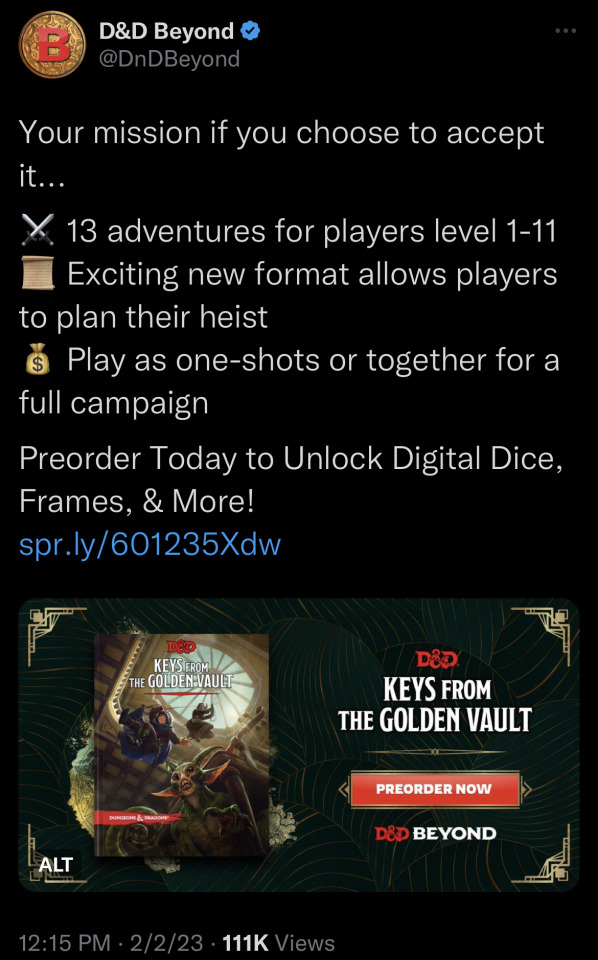
A good start is to wait until it’s on :
^^^^^^^^^^^^^^^^^^^^^^^^^^^^^^^
In the meantime, enjoy everything that’s on there already ☺️
#dungeons and dragons#d&d#dndbegone#opendnd#wotc#hasbro#5e.tools#ogl#wizards of the coast#orc license#paizo#pathfinder#ttrpg#dnd beyond#keys from the golden vault#heist#fantasy
4 notes
·
View notes
Text
It's 3 am
And I just saw for the first time in My life
A clear night sky. And I don't now how I have lived without that.
After like half and hour just looking up and taking it all
I am left with neck pain, a picture burned in My mind and soul and a new goal
In the future I WILL see our beutiful clear night sky again. I now that our dessert is nown for the clear view of the stars so now that's a goal. I'll get myself a truck and drive in the evening just to stay for the night in the truck and see all. The in the morning leave. I am determinated
#gotta get a truck first to#and license#and learn how to handle heat by my own#haso#humans are space orcs#humans are space oddities
12 notes
·
View notes